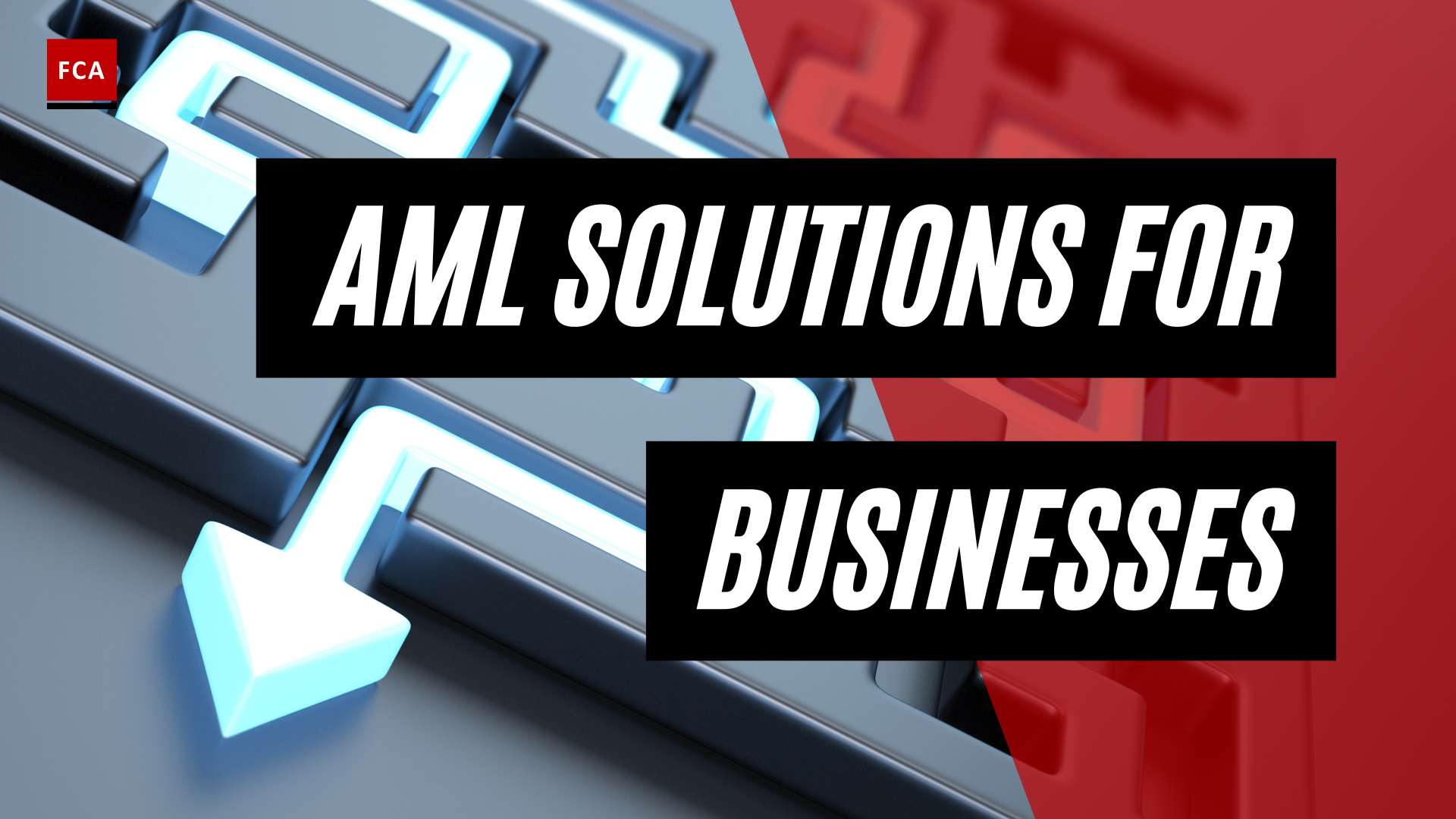The Role of Technology in AML Careers
As the field of Anti-Money Laundering (AML) continues to evolve, the role of technology is becoming increasingly important. Technology plays a vital role in AML processes, enabling organizations to meet regulatory requirements, minimize risks, and efficiently detect suspicious transactions (AML UAE). Let’s explore the growing importance of technology in AML and the latest trends in AML careers.
The Growing Importance of Technology in AML
Technology-driven solutions are revolutionizing the AML landscape. Advanced technologies, such as artificial intelligence (AI) and machine learning (ML), are being leveraged to enhance transaction monitoring, customer due diligence, and sanctions screening, improving the overall effectiveness of AML programs (AML UAE). These technologies enable financial institutions to analyze large volumes of data at unprecedented speed and accuracy, identifying complex patterns and anomalies that may indicate potential money laundering activities (Source).
Automation, particularly through robotic process automation (RPA), has transformed many aspects of AML compliance. RPA systems can perform routine, repetitive tasks such as data entry, transaction monitoring, and report generation, freeing up human resources to focus on more complex aspects of AML compliance (Source). Furthermore, data analytics and big data technologies allow financial institutions to gain deeper insights into customer behaviors and transaction patterns, enabling more effective monitoring and risk management (Source).
The integration of technology in AML workflows enhances the ability to identify and analyze potential money laundering activities more accurately and efficiently. This not only improves compliance standards but also significantly reduces operational costs and resources (Source). Organizations are increasingly recognizing the value of technology in streamlining their AML programs, leading to a growing demand for professionals with expertise in both AML compliance and technology (AML UAE).
Technology Trends in AML Careers
To stay ahead in the evolving AML landscape, professionals need to be aware of the latest technology trends in the field. Some of the notable trends in AML careers include:
-
Artificial Intelligence (AI) and Machine Learning (ML): The integration of AI and ML technologies in AML compliance allows for the analysis of large volumes of data at unprecedented speed and accuracy. Machine learning algorithms can identify complex patterns and anomalies in transaction data, enhancing the effectiveness of AML measures and reducing reliance on human resources.
-
Robotic Process Automation (RPA): Automation through RPA systems has transformed routine AML tasks, enabling faster and more efficient processing of data, monitoring of transactions, and generation of reports. RPA frees up human resources to focus on more strategic and complex aspects of AML compliance (Source).
-
Data Analytics and Big Data: The use of data analytics and big data technologies allows financial institutions to analyze vast amounts of data to uncover hidden patterns, trends, and correlations. By leveraging big data, institutions can gain deeper insights into customer behaviors and transaction patterns, enabling more effective monitoring and risk management (Source).
-
Blockchain Technology: Blockchain technology is gaining traction in the AML field, as it offers enhanced transparency, traceability, and security in financial transactions. The use of blockchain can help reduce fraud, enhance due diligence, and improve the overall efficiency of AML processes.
Keeping up with these technology trends is essential for AML professionals looking to excel in their careers. Acquiring the necessary technology skills and staying updated with the latest advancements will open up a world of opportunities in the ever-evolving field of AML.
In the next section, we will explore the specific technology skills and systems that are in demand for AML professionals.
Technology Skills for AML Professionals
As the role of technology in anti-money laundering (AML) continues to expand, professionals in this field need to possess the necessary technology skills to stay ahead. AML analysts, in particular, must develop a strong understanding of technology to effectively combat financial crimes and ensure compliance. In this section, we will explore the in-demand technology skills for AML analysts and specific systems and tools used in AML careers.
In-Demand Technology Skills for AML Analysts
According to job postings for AML analysts, there is a growing emphasis on technology-related skills (ZipRecruiter). AML professionals with strong technology skills have a competitive edge in the job market and access to a wider range of career opportunities. Some of the key technology skills that are highly sought after in the AML field include:
-
Data Analysis: AML analysts should have a solid foundation in data analysis techniques. Proficiency in tools like Microsoft Excel, SQL, and Python can help analysts effectively analyze large volumes of data and identify patterns or anomalies that may indicate suspicious activities.
-
Database Querying: Knowledge of querying languages like SQL (Structured Query Language) is essential for AML analysts. The ability to extract and manipulate data from databases enables analysts to perform detailed investigations and generate meaningful insights.
-
Automation Tools: Familiarity with automation tools can significantly enhance an AML analyst’s productivity. Automation tools, such as robotic process automation (RPA) or workflow automation, can streamline repetitive tasks, allowing analysts to focus on higher-value activities.
-
Visualization Software: Proficiency in visualization software, such as Tableau or Power BI, is increasingly important for AML analysts. These tools enable analysts to present complex data in a visual and digestible format, facilitating better communication and decision-making.
It’s worth noting that technology skills alone are not sufficient in the AML field. A strong foundation in AML regulations, risk assessment, and investigative techniques is equally important. The combination of AML expertise and technology skills positions professionals for success in this evolving field.
Specific Systems and Tools for AML Careers
Employers seeking AML analysts with technology skills often require knowledge of specific systems and tools (ZipRecruiter). These systems and tools are designed to assist AML professionals in their daily tasks, such as transaction monitoring, customer due diligence, and suspicious activity reporting. Some commonly mentioned systems and tools in AML job postings include:
-
Actimize: Actimize is a popular suite of solutions used for financial crime prevention and compliance. AML analysts with Actimize experience have an advantage when applying for positions that utilize this system.
-
Mantas: Mantas is another widely used AML solution that helps financial institutions detect and prevent money laundering and other financial crimes. Proficiency in Mantas can open doors to exciting career opportunities in AML.
-
Fircosoft: Fircosoft provides solutions for screening transactions and customers against global sanctions and watchlists. Knowledge of Fircosoft is highly valued in the AML industry, especially in organizations that deal with international transactions.
-
Detica: Detica, now part of BAE Systems Applied Intelligence, offers advanced analytics and risk management solutions. AML professionals familiar with Detica possess valuable skills for identifying emerging risks and combating financial crimes.
By mastering these specific systems and tools, AML professionals can effectively leverage technology to streamline their workflows, improve efficiency, and enhance their ability to detect and prevent financial crimes.
As the AML landscape continues to evolve, professionals with technology skills are in high demand. The intersection of anti-money laundering regulations and technology expertise offers exciting career paths and opportunities to make a significant impact in the fight against financial crimes. To further enhance your technology skills in the AML field, consider exploring AML technology training programs and seeking AML technology certifications to stay at the forefront of this dynamic industry.
Career Opportunities in AML with Technology
As technology continues to shape the field of anti-money laundering (AML), career opportunities have expanded for professionals with technology skills. Industries and organizations across various sectors are actively seeking AML professionals who possess the necessary expertise to leverage technology in combating financial crimes.
Industries and Organizations Hiring AML Professionals with Technology Skills
Professionals with technology skills can find job opportunities in a wide range of industries and organizations. Some of the sectors that actively hire AML professionals with technology expertise include:
- Technology companies: Tech firms that provide solutions for financial institutions and regulatory compliance are in need of AML professionals who can navigate the intersection of technology and compliance.
- Financial services: Banks, credit unions, investment firms, and other financial institutions are actively seeking AML professionals who understand the complexities of financial transactions and possess technology skills to analyze data effectively.
- Consulting firms: Consulting firms specializing in AML and financial crime prevention often hire professionals with technology skills to assist their clients in implementing efficient compliance programs.
- Government agencies: Government bodies responsible for combating money laundering and financial crimes also require AML professionals who can leverage technology to enhance their investigative capabilities.
To excel in the AML field with technology skills, professionals should consider acquiring relevant certifications and training programs specific to AML technology. These certifications and training programs can provide a competitive edge and demonstrate a commitment to staying updated with the latest industry standards. For more information on AML technology certifications and training programs, refer to our article on aml technology certifications.
Job Titles and Positions in AML Technology
The demand for AML professionals with technology skills has led to the creation of specialized job titles and positions within the field. Some common job titles and positions in AML technology include:
- AML Data Analyst: These professionals are responsible for analyzing large volumes of data using advanced analytical tools and techniques to identify suspicious activities and potential money laundering patterns.
- AML Systems Specialist: These specialists focus on managing and optimizing the technology systems and tools used for AML compliance, such as Actimize, Mantas, Fircosoft, or Detica. They ensure that these systems are up-to-date, properly configured, and effectively integrated into the compliance workflow.
- AML Technology Consultant: Consultants in this role provide expert advice and guidance to organizations on implementing and optimizing technology solutions for AML compliance. They assist in designing and implementing effective compliance programs, conducting risk assessments, and recommending appropriate technology tools.
- AML Compliance Analyst with Technology Focus: These professionals possess a combination of AML compliance knowledge and technology skills. They play a vital role in ensuring that AML processes are aligned with regulatory requirements and leverage technology tools for efficient compliance.
Career paths in AML technology are diverse, and the specific job titles and positions may vary depending on the organization and its specific needs. AML professionals with a strong understanding of both anti-money laundering regulations and technology are in high demand, given the increasing complexity of financial transactions and the growing use of technology in financial crime activities.
As the AML industry continues to evolve, advancements in technology will drive further career opportunities in the field. Professionals who embrace technology and continuously update their skills will be well-positioned to succeed in AML careers. For more information on technology advancements in the AML industry, refer to our article on technology advancements in aml industry.
The Impact of Technology on AML Compliance
Technology has significantly transformed the landscape of Anti-Money Laundering (AML) compliance, revolutionizing the way organizations detect and prevent illicit financial activities. The integration of advanced technologies in AML processes has enhanced the effectiveness, efficiency, and accuracy of compliance measures. In this section, we will explore how technology is enhancing AML processes and the benefits it brings to AML compliance efforts.
Enhancing AML Processes with Technology
The role of technology in streamlining AML workflows is multifaceted. It enables organizations to identify and analyze potential money laundering activities more accurately and at a fraction of the time required by traditional methods. This not only improves compliance standards but also significantly reduces operational costs and resources (Source).
One of the key advancements in technology-driven AML compliance is the utilization of artificial intelligence (AI). AI-powered AML systems leverage machine learning algorithms to analyze large volumes of data at unprecedented speed and accuracy. These algorithms can identify complex patterns and anomalies in transaction data, which are indicative of potential money laundering activities. By automating the analysis process, AI enhances the effectiveness of AML measures and reduces reliance on human resources (Source).
Automation, specifically through robotic process automation (RPA), has also transformed various aspects of AML compliance. RPA systems can perform routine, repetitive tasks such as data entry, transaction monitoring, and report generation. By automating these processes, RPA speeds up the overall compliance process and frees up human resources to focus on more complex aspects of AML compliance (Source).
Data analytics and big data play a crucial role in AML compliance as well. These technologies enable financial institutions to analyze large sets of data to uncover hidden patterns, trends, and correlations. Leveraging big data allows institutions to gain deeper insights into customer behaviors and transaction patterns, enabling more effective monitoring and risk management (Source).
Benefits of Technology in AML Compliance
The integration of technology into AML compliance brings several benefits to organizations and professionals in the field. Some of the key benefits include:
-
Improved Detection and Prevention: Technology-driven AML systems enhance the ability to identify and detect potential money laundering activities with greater accuracy and efficiency. This leads to improved compliance standards and reduced risks of financial crime.
-
Efficiency and Operational Cost Savings: Automation and advanced technologies streamline AML processes, reducing the need for manual efforts and increasing operational efficiency. This results in cost savings and enables organizations to allocate resources more effectively.
-
Enhanced Risk Management: Technology enables better risk management by providing insights into customer behaviors, transaction patterns, and potential red flags. This allows organizations to proactively mitigate risks and ensure compliance with regulatory requirements.
-
Scalability and Adaptability: Technology-driven AML systems can scale and adapt to the evolving landscape of financial crimes. They can handle large volumes of data, accommodate regulatory changes, and incorporate emerging technologies, ensuring organizations stay ahead in the fight against money laundering.
By leveraging the power of technology, AML compliance professionals can enhance their capabilities, improve detection rates, and strengthen their organization’s overall anti-financial crime efforts. As technology continues to advance, the impact on AML compliance is expected to grow, creating new opportunities and challenges for professionals in this field. To explore the future of AML careers with technology, continue reading our section on Advancements in Technology for AML Careers.
Challenges and Risks in AML Technology
As technology continues to play a vital role in the fight against money laundering, it also presents new challenges and risks in the field of anti-money laundering (AML). AML professionals must be aware of these emerging challenges and take proactive steps to mitigate the associated risks.
Emerging Challenges in AML Technology
-
Metaverse and Virtual Currencies: The introduction of metaverse solutions and virtual currencies may introduce new challenges for AML regulations. These virtual platforms can provide fraudsters with avenues for money laundering and illicit transactions. AML solutions need to adapt to monitor user behavior and transactions in these virtual spaces to uncover potential incidents of money laundering (Unit21).
-
Sophisticated Money Laundering Techniques: With the advancement of technology, money launderers are continually evolving their techniques to evade detection. They may use advanced encryption methods, anonymization tools, and decentralized platforms to hide their illicit activities. AML professionals must stay updated on the latest trends and techniques employed by money launderers to effectively combat these evolving threats.
-
Regulatory Compliance: AML regulations and compliance requirements are constantly evolving to keep up with emerging risks and technological advancements. AML professionals face the challenge of staying compliant with changing regulations and ensuring that their AML technology systems are up to date and capable of meeting regulatory requirements. Regular monitoring, updates, and compliance training are essential to address this challenge.
Mitigating Risks in AML Technology
To mitigate the risks associated with AML technology, AML professionals can adopt several strategies and best practices:
-
Invest in AML Technology Training: AML professionals should invest in continuous learning and training programs to stay updated on the latest AML technology trends and tools. This helps them to better understand potential risks and challenges and develop effective strategies to mitigate them. AML technology certifications and training programs can provide valuable insights and knowledge in this regard.
-
Collaboration and Information Sharing: Collaboration and information sharing among regulatory bodies, financial institutions, and AML professionals are crucial in mitigating risks. By sharing insights, best practices, and emerging trends, stakeholders can collectively address the challenges posed by evolving AML technology. Industry conferences, forums, and online communities can facilitate such collaboration.
-
Implement Robust AML Technology Solutions: Financial institutions and organizations should invest in robust AML technology solutions that incorporate artificial intelligence (AI), machine learning (ML), and data analytics capabilities. These technologies can enhance the detection and analysis of potential money laundering activities. Regular updates and system audits are necessary to ensure the effectiveness and security of these solutions.
-
Adopt Risk-Based Approaches: AML professionals should implement risk-based approaches to prioritize resources and efforts in combating money laundering. By identifying high-risk areas and focusing on them, AML professionals can allocate resources effectively and deploy appropriate technology solutions to mitigate specific risks.
-
Regular Compliance Assessments and Audits: Regular compliance assessments and audits help identify any gaps or weaknesses in AML technology systems and processes. These assessments ensure that the implemented technology solutions are functioning as intended and are compliant with regulatory requirements. Any identified gaps or weaknesses should be promptly addressed to minimize potential risks.
By addressing the emerging challenges in AML technology and implementing effective risk mitigation strategies, AML professionals can navigate the evolving landscape of AML compliance and leverage technology to enhance their efforts in combating money laundering effectively. The future of AML careers with technology holds immense potential, but it also requires continuous adaptation, learning, and collaboration to stay ahead of emerging risks.
The Future of AML Careers with Technology
As the world of finance becomes increasingly complex, the demand for AML professionals with expertise in technology continues to grow. Financial institutions recognize the crucial role that technology plays in anti-money laundering (AML) compliance and are seeking skilled individuals who can navigate the intersection of AML regulations and technology. In this section, we will explore the growing demand for AML professionals with technology expertise and the advancements in technology that are shaping AML careers.
Growing Demand for AML Professionals with Technology Expertise
The integration of technology in AML processes has become essential for financial institutions to streamline compliance efforts and enhance detection capabilities. According to ZipRecruiter, AML professionals with expertise in both AML regulations and technology are in high demand. The growing complexity of financial transactions, coupled with the increased use of technology in financial crime activities, has created a need for professionals who can effectively leverage technology to combat money laundering activities.
Financial institutions are actively seeking professionals who possess a deep understanding of AML compliance requirements and the technological tools used in the field. The ability to navigate and optimize AML systems and technologies is highly valued. Individuals with expertise in AML technology can find opportunities in various industries, including banking, insurance, fintech, and consulting firms specializing in AML technology solutions. Explore our article on aml technology consulting opportunities to learn more about this specific career path.
The demand for AML professionals with technology expertise is also reflected in the salary ranges for these roles. According to AML UAE, professionals with advanced technology skills in AML can command competitive salaries due to the specialized nature of their roles. This growing demand for AML professionals with technology expertise presents exciting career opportunities for individuals looking to make an impact in the fight against financial crime.
Advancements in Technology for AML Careers
Technological advancements are revolutionizing the way AML professionals approach their work. AI, machine learning (ML), robotic process automation (RPA), data analytics, and big data are just a few examples of the technologies reshaping the AML landscape. These advancements enable financial institutions to enhance the accuracy, efficiency, and effectiveness of their AML processes.
AI and ML technologies are being leveraged to analyze large volumes of data at unprecedented speed and accuracy. Machine learning algorithms can identify complex patterns and anomalies in transaction data, aiding in the detection of potential money laundering activities. These technologies reduce reliance on manual efforts and enhance the effectiveness of AML measures. Discover more about the impact of AI and ML in AML compliance in our article on technology advancements in the AML industry.
Automation, particularly through RPA, has transformed routine tasks within AML compliance. Robotic process automation systems can perform repetitive tasks such as data entry, transaction monitoring, and report generation. By automating these processes, financial institutions can improve efficiency and free up human resources to focus on more complex aspects of AML compliance.
Data analytics and big data play a crucial role in AML compliance as well. These technologies allow institutions to analyze large datasets to uncover hidden patterns, trends, and correlations. By leveraging big data, financial institutions gain deeper insights into customer behaviors and transaction patterns, enabling more effective monitoring and risk management.
As technology continues to evolve, AML professionals must stay updated with the latest advancements. Continuous learning and professional development, such as obtaining AML technology certifications or participating in AML technology training programs, can help individuals thrive in their AML careers.
The future of AML careers with technology is promising. The growing demand for AML professionals with technology expertise and the advancements in technology are reshaping the AML landscape. By embracing these opportunities and staying abreast of technological advancements, individuals can carve out successful and fulfilling careers in the intersection of AML and technology. Explore potential AML career paths in technology and take advantage of the exciting possibilities that lie ahead.








